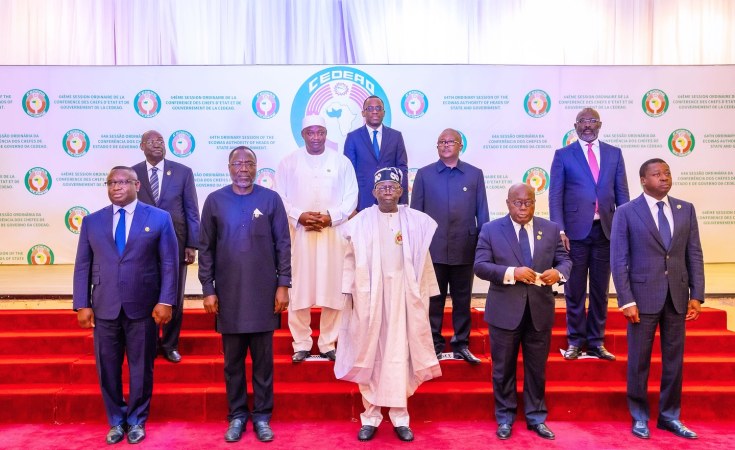The ECOWAS court ruled that the Nigerien junta failed to meet the additional requirement for the case to be admissible.
The ECOWAS Court of Justice in Abuja, on Thursday, dismissed a request to lift the sanctions imposed by the ECOWAS Authority of Heads of State and Government on Niger Republic in the aftermath of the latest coup in the country.
Although, the court affirmed that it had jurisdiction to hear the case, it ruled that it could not grant the request for interim measures requested by the Nigerien junta.
The president of the court, Edward Asante, who led the three-member panel of the court that gave the decision, held that the junta failed to meet the additional requirement for the case to be admissible, according to the highlights of the judgement released by the court's communications unit on Thursday.
The two other judges on the panel - Gbéri-bè Ouattara and Dupe Atoki - agreed with the judgement.
Some Nigerien military officers led by Abdourahmane Tchiani, an army general, on 26 July, overthrew President Mohammed Bazoum. He was detained and still being held by the junta in Niamey, the capital of Niger.
In a pushback to the military takeover, the ECOWAS highest authority led by Nigerian president, Bola Tinubu, slapped a range of sanctions on Niger in a desperate bid to restore constitutional order.
Under the sanctions, the Nigerian government cut off electricity supply to Niger, triggering power crisis in the junta-led country.
The regional body also threatened to invade Niger with a viewing to restoring Mr Bazoum to power.
To push back the sanctions, the junta approached the ECOWAS court, praying a series of orders to halt the penalties.
The Nigerien military regime and seven other applicants filed the request at the court for interim measures as part of a broader case challenging the legality of the coup-related sanctions imposed by ECOWAS.
The applicants said the border closure and suspension of electricity supply by Nigeria had brought on Nigeriens adverse effects, including shortage of food, medicine and electricity .
They asked the court to issue interim orders to compel the Authority of Heads of State and Government of ECOWAS to immediately suspend the sanctions.
Rejection
Rejecting the junta's request, the court explained that the Nigerien military government lacked the competence to appear before it.
The court said the July coup robbed the junta the right to institute a suit before a constitutional body like the ECOWAS Court.
''The substantive application was also held to be prima facie inadmissible in respect of the rest of the Applicants within the meaning of Articles 9(2) and 10(c) of the Protocol of the Court,'' the court's communication unit's statement also stated.
Background
At the hearing of the suit on 21 November, the Nigerien government's lawyer, Moukaila Yaye, and five others argued that the sanctions imposed by ECOWAS has crippling effects on the Nigerien people.
In the suit, the junta lamented that the sanctions had occasioned, ''shortage of food, medicine and electricity,'' due to the closure of borders and suspension of electricity supply by Nigeria.
The government urged the court to issue an interim orders compelling the Authority of Heads of State and Government of the regional body to immediately suspend the sanctions.
Referencing the case of three other West African countries toppled by coups, the Nigerien regime said ECOWAS overreacted by imposing the sanctions on it.
Aside Niger, three ECOWAS member states - Mali, Burkina Faso and Guinea - are under military rule.
In the substantive application, the applicants - the Republic of Niger, six Nigerien organisations and a Nigerien national - asked the court to declare the measures taken by the ECOWAS Authority of Heads of State and Government during its extraordinary sessions of 30 July and 10 August 2023, to restore constitutional order in the Republic of Niger illegal.
They requested the court to nullify all decisions of ECOWAS organs imposing sanctions, including the decision to resort to military intervention in the Republic of Niger.
ECOWAS' defence
In its defence, ECOWAS Authority represented by François Kanga-Penond told the ECOWAS court the that the Republic of Niger is being ruled by a military junta which seized power unconstitutionally in violation of ECOWAS legal instruments.
Mr Kanga-Penond contended that since such an unconstitutional government which had been denounced by ECOWAS and the international community could not be legally deemed to represent the country, both the substantive application and request for provisional measures were inadmissible.
He therefore urged the court to decline the request for interim measures.
Other reasons for dismissing the suit
In its ruling, the court held the view that an entity resulting from an unconstitutional change of government, and not acknowledged by ECOWAS as a government of a member state, inherently lacks the capacity to initiate a case before the court with the aim of obtaining benefits or reprieve.
Consequently, the court dsmissed the substantive suit and the request for interim measures sought by the junta in the name of Niger by an unconstitutional and unrecognised governmental authority, were inadmissible.
Concerning the seven non-state applicants suing alongside the Republic of Niger, the court held that they failed to provide specific details regarding the nature and extent of the harm suffered by each of them from the measures imposed on Niger.
This lack of specificity made it challenging to differentiate their legal interests in this case from those of the Republic of Niger, the court said. Given these circumstances, the court concluded that the application was prima facie inadmissible relative to the non-state Applicants as per the provisions of Articles 9(2) and 10(c) of the Protocol of the Court.
Having concluded that the substantive application before the court was prima facie inadmissible, the court held that the request for interim measures could not be granted. It accordingly dismissed it.


